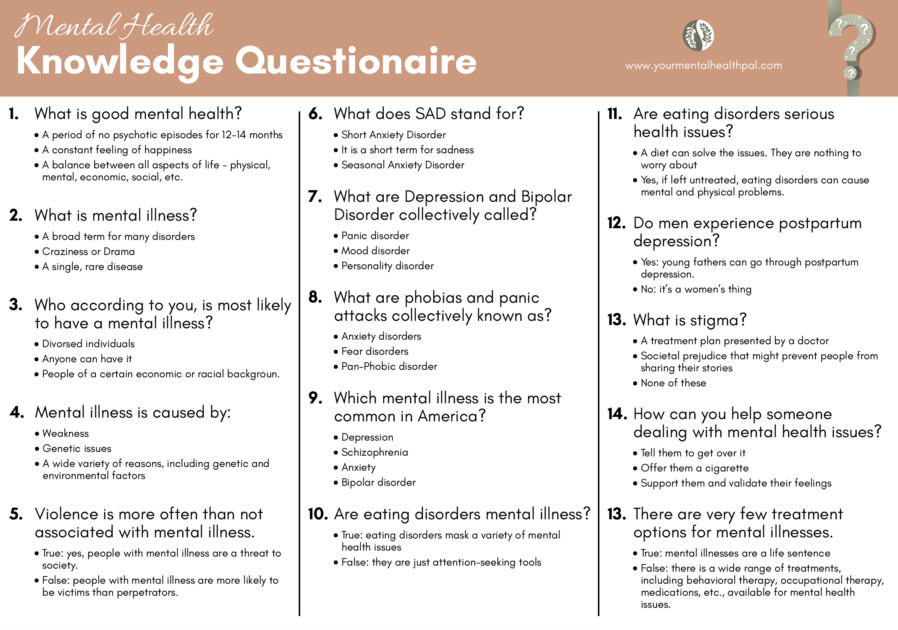
We regularly talk about spreading mental health knowledge and awareness. And that is good. It’s extremely important to be aware of something that affects each one of us and that a quarter of the world’s population suffers from.
But perhaps the term is a bit unspecific, though.
We don’t exactly need to spread mental health awareness among people. We need to help become aware that mental health can, and almost regularly, go wrong. And that when somebody feels like their mental health is faltering, they should be allowed proper support and treatment that someone with a rather common physical problem would.
This is precisely where mental health knowledge helps.
Increased exposure to people with different ethnicities and cultures helps decrease stereotypes and prejudices. Similarly, exposure to or discussions around mental health issues can help improve their understanding.
Imagine what happens if we achieve this?
We build a society that is able to look for signs and symptoms of mental health issues and look for help. We provide a safe space for people having mental health issues.
So until that happens, let’s all pledge to continue the conversation. To join in, we share with you a mental health knowledge questionnaire that will help you gauge your understanding of mental health issues. At the end of the blog post, find our mental health assessment questionnaire to know how good is your mental well-being lately.

Check your Knowledge: Mental Health Knowlege Assessment Questionnaire
How well do you know about mental health and related issues? Though the stigma surrounding mental health issues has reduced, a significant population lacks a basic understanding of what mental health means.
We have made a list of 15 questions about common mental health concerns for this mental health knowledge questionnaire. Answer the questions honestly to find out how aware you are.
1. What is good mental health?
- A period of no psychotic episodes for 12-14 months
- A constant feeling of happiness
- A balance between all aspects of life – physical, mental, economic, social, etc.
2. What is a mental illness?
- A broad term for many disorders
- Craziness or Drama
- A single, rare disease
3. Who, according to you, is most likely to have a mental illness?
- Divorced Individuals
- Anyone can have it
- People of a certain economic or racial background.
4. Mental illness is caused by:
- Weakness
- Genetic issues
- A wide variety of reasons, including genetic and environmental factors.
5. Violence is more often than not associated with mental illness.
- True: yes, people with mental illnesses are a threat to society.
- False: people with mental illness are more likely to be victims than perpetrators.
6. What does SAD stand for?
- Short Anxiety Disorder
- It is a short term for sadness.
- Seasonal Anxiety Disorder
7. What are Depression and Bipolar Disorders collectively called?
- Panic disorders
- Mood disorders
- Personality disorders
8. What are phobias and panic attacks collectively known as?
- Anxiety disorders
- Fear disorders
- Pan-Phobic disorders
9. Which mental illness is the most common in America?
- Depression
- Schizophrenia
- Anxiety
- Bipolar disorder
10. Are eating disorders mental illnesses?
- True: eating disorders mask a variety of mental health issues
- False: they are just attention-seeking tools.
11. Are eating disorders serious health issues?
- A diet change can solve the issues. They are nothing to worry about
- Yes, if left untreated, eating disorders can cause severe mental and physical problems.
12. Do men experience postpartum depression?
- Yes: young fathers can go through postpartum depression.
- No: it’s a women’s thing.
13. What is stigma?
- A treatment plan presented by a doctor
- Societal prejudice that might prevent people from sharing their stories.
- None of these.
14. How can you help someone dealing with a mental health issue?
- Tell them to get over it
- Offer them a cigarette.
- Support them and validate their feelings.
15. There are very few treatment options for mental illnesses.
- True: mental illnesses are a life sentence.
- False: there is a wide range of treatments, including behavioral therapy, occupational therapy, medications, etc., available for mental health issues.
Mental Health Knowledge Questionnaire Solutions
Now that you have attempted (hopefully honestly) the mental health knowledge questionnaire, it’s time for the results. The solutions for the above questions are listed below:
- A balance between all aspects of life – physical, mental, economic, social, etc.
- A broad term for many disorders.
- Anyone can have it.
- A wide variety of reasons, including genetic and environmental factors.
- False: people with mental illness are more likely to be victims than perpetrators.
- Seasonal Anxiety Disorder.
- Mood disorders.
- Anxiety disorders.
- Anxiety.
- True: eating disorders mask a variety of mental health issues.
- Yes, if left untreated, eating disorders can cause severe mental and physical problems.
- Yes: young fathers can go through postpartum depression.
- Societal prejudice that might prevent people from sharing their stories.
- Support them and validate their feelings.
- False: there is a wide range of treatments, including behavioral therapy, occupational therapy, medications, etc., available for mental health issues.
Check your mental health: Mental Health Questionnaire
Having mental health knowledge is good. But it is also essential to apply that in your daily life. There are so many times you would feel overwhelmed and anxious. Despite that, do you ever sit and ask yourself how you are?
Let’s be honest.
Most of us don’t monitor our mental health at all. To help you start this journey, we bring you a mental health questionnaire to keep track of how you are feeling regularly.
The first step is what you have to take. Slow yourself down long enough to ask yourself some honest questions. And then give yourself time and space to answer them correctly.
1. How Am I Feeling Today?
This sounds pretty obvious. But how many times do you ask yourself how you are feeling and pause to reconsider your answer?
Assessing your mental health starts with checking in on how you feel. Do you notice frequent signs of anxiety, stress, and burnout?
Take a scale of 1-5 and evaluate how you feel daily. Try doing it physically in a diary or journal to keep track of the numbers. If the number is consistently low or declining, you might need to look for proper help.
Additionally, also take cognizance of how you feel physically. Sometimes mental health issues can show up in the form of physical symptoms.
Stress: Skin rash, headaches, body pains, etc.
Depression: Appetite changes, weight changes, etc.
Anxiety: Stomach aches, headaches, muscle tensions, etc.
2. What’s been worrying me lately?
Next, take a moment to ask yourself about the cause of your worries? Is it friends, family, work, or finances? There can be many answers to this question. However, it is essential to know the potential cause of your triggers and address them appropriately.
For instance, if you are worried about work – take a break and try concentrating on hobbies and activities that you might find calming.
3. Am I fulfilling my body’s basic needs?
Sometimes in a rush to do other things, we forget the fundamental necessities – food, exercise, and sleep. These are pretty simple but practical ways to ensure your well-being.
Make sure that you are:
- eating healthy food,
- sleeping at least 7-9 hours, and
- going for a walk or dancing – basically 10 minutes of any physical activity that you find fun.
Additionally, not caring for your body might also indicate a mental health issue. Not sleeping might be a sign of depression or anxiety. Inadequate appetite might be a sign of stress.
Your mind and body are more deeply connected than you think. Hence taking care of both is necessary.
4. What am I doing for recreation or joy?
With our never-ending to-do lists, it gets increasingly common to push our recreational activities to the very bottom. But taking the time out to have fun is equally important.
Ask yourself what you are doing to have fun or joy. If you can’t think of something, that’s a sign of worry.
Try out different recreational hobbies once in a while to get away from your busy schedules.
To read more about good hobbies for mental health, click here.
Conclusion
Spreading mental health knowledge and awareness is good. But that is only the beginning of a long process. The goal is to get the awareness channeled into the process of dealing with mental health issues. Hopefully, when we continuously analyze ourselves to track our mental health, we might get closer to the end goal.
Tell us in the comment section about your score on the mental health knowledge questionnaire.
Now that you have figured out your mental health knowledge let’s take you to another quiz.
Take this quiz to find out if you are being gaslighted or not. To learn more about mental health, subscribe to Your Mental Health Pal.

